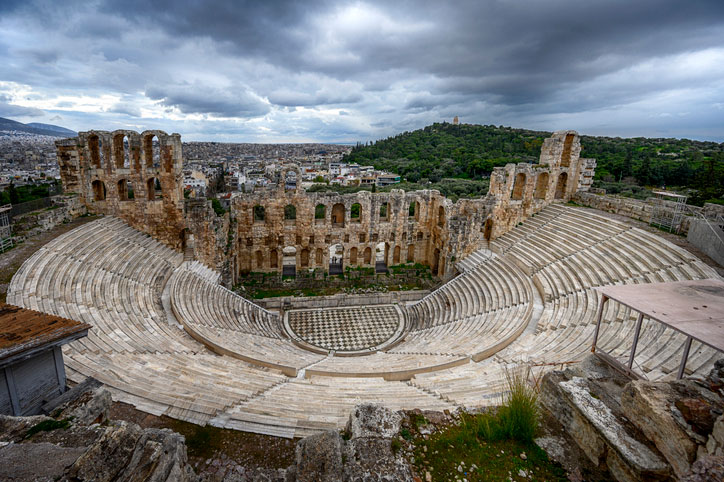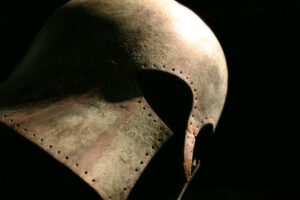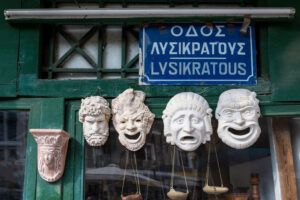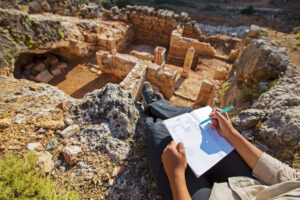

The study of classical civilization is the study of ourselves and our cultural expressions. The templates for much of what enriches our society and culture today were forged in classical antiquity:
- Literature
- Theater and the performing arts
- Politics and political systems
- Social justice and enfranchisement
Studying classical antiquity also provides a good occasion to master languages like Ancient Greek and Latin, and it goes hand-in-hand with the study of archaeology.
Book-ended by Classical Greece in the fifth century BC and the fall of the Roman Empire in the sixth century AD, the Mediterranean-centered thousand-year-plus span of time in which the classical civilizations thrived saw the rise of some of the most influential developments and cultural traditions. Many of them have withstood the test of time and are still honored today. The next time you vote, read a novel, watch a theatrical performance, or flush a toilet – well, props go to the classical civilizations.
Classical Civilization Introduces the Concept of Enfranchisement, a Liberal Arts Ideal We’re Still Striving for Today
Democracy: from Greek demos-δήμος meaning “common people,” and, kratos-κράτος meaning “rule/force;” a system of government in which people choose their governing officials.
It’s not a coincidence that what’s termed Classical Antiquity begins around the time Athens established the world’s first democracy in 508 BC. This marked the beginning of a radical idea that the popular will of the people, as opposed to brute domineering physical force, is what establishes legitimacy for leaders.
It’s an ideal that we and any democratic country value in the present day. The concept of democracy has also evolved significantly over time, and we owe the Classical Greeks homage for developing this.
In the time of Classical Athens only citizens were allowed to vote, and citizens were defined as male Athenians who had completed their military service. Slaves, women, freed slaves, and foreigners were denied the right to vote. Viewed with today’s ethics the shortcomings of this democracy are blatant, but it’s also important to keep the sixth century BC context in perspective: this development of Athenian democracy represented a successful rebellion of a class of common citizens against a well-established and entrenched aristocracy that had previously dominated Athens.
And a similar dynamic holds true in the United States. After successfully rebelling from the British Empire, the Founders looked back to Classical Greece when establishing their system of government. They were familiar with Plato’s The Republic and Aristotle’s Politics. “Life, liberty, and the pursuit of happiness” draws directly from the second century BC Epicureanism school of philosophy.
“We must, therefore, pursue the things that make for happiness, seeing that when happiness is present, we have everything; but when it is absent, we do everything to possess it.”
― Epicurus
At its founding, the Constitution gave individual states the power to determine who could vote. Of the original 13, a property-owning white male had the best chances of being enfranchised, however this was not a universal rule.
Some states emphasized property ownership over all else, extending the right to vote to qualifying African Americans and women. Others emphasized being male, allowing both white and African American males the right to vote while denying the same to women.
But regardless of the metric, 18th century American democracy falls far short of the universal enfranchisement we value today. Still, this marked a relative improvement over the form of monarchical government from which the 13 colonies rebelled, just as the original Athenian democracy marked a relative improvement over unelected aristocratic rule.
Studying classical civilizations brings the liberal arts full-circle through history, cultural development, and social justice. It shows how far we’ve come and how far we still have to go.
Classical Literature; Foundational Liberal Arts Subjects Looking from the Past to the Present
When it comes to literature, not only philosophical concepts but structure itself can be traced back to classical civilization.
 “Protagonist” and “climax” are literary terms derived from ideas that originated in Classical Greece along with the literary concept of the novel. Lives of Outstanding Generals is recognized as one of the first biographies ever published, a feat accomplished in 44 BC by the Roman Cornelius Nepos.
“Protagonist” and “climax” are literary terms derived from ideas that originated in Classical Greece along with the literary concept of the novel. Lives of Outstanding Generals is recognized as one of the first biographies ever published, a feat accomplished in 44 BC by the Roman Cornelius Nepos.
Similarly, what were known as “apologias and confessions” became the classical progenitors of what we today call the autobiography. The Roman-Jewish historian Titus Flavius Josephus published one of the world’s first autobiographies, at least in part, to defend his name against spurious allegations made by a rival author in what we’d recognize today as a Twitter war.
Basic concepts like individualism have a common thread to classical antiquity. Freud’s concept of the Ego; the organizing agent of an individual, stems from the the Latin word for “I,” and is also synonymous with the Greek ego-εγώ, also meaning “I.”
The liberal arts provides a perfect context for understanding how literary techniques developed two thousand years ago still have a relevant influence in our modern lives.
Classical Civilization Puts the “Arts” in Liberal Arts
When it comes to some of the most renowned works of art, many trace their inspirations back to classical civilization, especially those from the Renaissance, a term that literally refers to a rebirth of classical civilization arts. With inspiration in classical antiquity, these pieces influenced their contemporaries in ways that shaped the trajectory of art history through the present:
- Triumph of Galatea – A fresco by Raphael, depicting the star of a Greek myth about a sea nymph falling in love with a peasant.
- Leda and the Swan – A painting by da Vinci depicting the characters from a Greek myth about a princess and Zeus in the form of a swan.
- The Birth of Venus – A painting by Botticelli showing the Roman goddess Venus as she comes ashore after her birth in a giant scallop shell.
The Renaissance was a response to religious restrictions and stringent cultural norms. It looked back to the relative freedom espoused in classical antiquity, recorded and preserved in Arabic books that were rediscovered and translated in cosmopolitan Middle Ages Italy. Topics like these –history, civilizations, cultures, and freedom of thought– are ripe for analysis in the context of a liberal arts education.
"Comedy is an imitation of men worse than the average; worse, however, not as regards any and every sort of fault, but only as regards one particular kind, the Ridiculous, which is a species of the Ugly."
― Aristotle
 Greek theater preceded the advent of democracy by around two centuries, importantly hinting that mockery is an essential ingredient in the recipe to overthrow illegitimate rulers.
Greek theater preceded the advent of democracy by around two centuries, importantly hinting that mockery is an essential ingredient in the recipe to overthrow illegitimate rulers.
Growing out of a Classical Greek sense of festival that included religion, law, and politics, theater as we know it today originated in sixth-century Greece. Elements like a chorus, main character, comedic humor, and interactive characters came into their own in Classic Antiquity.
Athens saw the origin of foundational forms of theater:
- Tragedy – While the exact origin of Greek tragedy is still a hotly contested academic topic, its combination of a narrator, chorus, and interactive characters revolutionized the performing arts, having a strong influence on Roman theater and the Renaissance.
- Comedy – Pioneered by Aristophanes who infused his works with political satire, sexual innuendo, and toilet humor, for better or worse these subjects remain potent vehicles of laughter up through the present.
- Satyr Play – While tragedies and comedies are easily recognizable today, this form representing a combination of the two is not. And this may be for good reason: Satyr Play is described as incorporating tragedian elements like dialogue, chorus, dancing, and costumes. However the language it uses to convey its message is heavy on themes you might find scrawled on the stall walls of a rest stop bathroom.
In ancient Rome the theater scene took off as the state transitioned from a monarchy to a republic. While older Greek elements like tragedy and comedy still had a strong influence, the Romans added their own flare that was an attempt to perfect entertainment, complete with nudes and acrobatics.
Augmenting the Greek template for comedy, Roman comedy infused these familiar modern-day character archetypes as regulars in their plays:
- The immoral person who follows the letter of the law and is rewarded
- The selfish person who only cares about fulfilling his or her own gratifications
- The arrogant fighter who likes to brag
The lens of liberal arts provides a common thread for connecting what were new developments in the classical theatrical world with what we take for granted in the present day.
Archaeology and Classical Studies
 Aside from what has been preserved in books over millennia through countless translations, our best shot at understanding classical civilizations is through archaeology, which is why this subject is so important in this field.
Aside from what has been preserved in books over millennia through countless translations, our best shot at understanding classical civilizations is through archaeology, which is why this subject is so important in this field.
Archaeology, literally an ancient Greek word meaning, “the study of ancient history,” gets at the very roots of modern-day Greece and Italy. Not only is it key for understanding the origins of Western civilization; today the governments of these countries recognize that what archaeologists discover has implications for their respective national identities.
Some of the most important archaeological sites in Greece are:
- The Acropolis in Athens
- Delphi in Central Greece
- Olympia on the Peloponnesian Peninsula
- Mycenae near Argolis
- The Ancient City of Corinth
Some of the most important archaeological sites in Italy include:
- The Roman Forum
- The Colosseum of Rom
- Ostia Antica near Ostia
- The rocky necropolis of Pantalica in Syracuse
- The ancient city of Pompie
Any good liberal arts program will not only cover Classical Civilizations; it will also cover the archaeological means and methods university scholars use to understand their classical predecessors.






